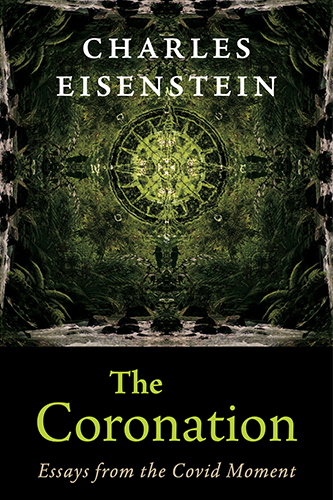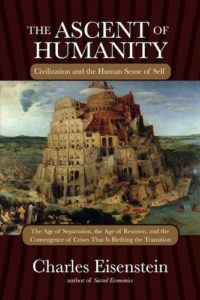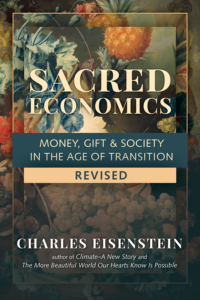Climate — A New Story
Chapters
Chapter10: Money and Debt
Hypocrisy
What do you think is the main impediment that keeps you from devoting your life to ecological or social healing? For many people, it is the necessity to make money in the very economy that is consuming the world’s social and ecological capital. Ultimately, that is where the money comes from: it comes from investment credit extended to whoever will create new goods and services. Those firms hire employees who will help them achieve that goal. If your goal is at odds with that—if your goal is not to help turn nature into products and community into services—then you are going to have a hard time finding a job, because generally speaking, that’s where the money comes from.
There is no law of physics that says we must create money the way we do. Money is an expression of a social agreement about what is valuable and where to apply our collective will. We could choose to create money in a way that directly values and supports ecological and social healing. To some extent we already do this—central banks, which are quasi-public institutions, purchase government debt that funds programs. However, as interest-bearing debt it still feeds the growth imperative. An alternative would be zero-interest, negative-interest, or government-issued “positive money” issued in direct subsidy of social or environmental healing.
Environmentalists will always be fighting an uphill battle unless and until we change our financial system. Railing against corporate greed misses the point. Corporations are only acting out a systemic imperative. Railing against consumer hypocrisy misses the point as well. Can you blame the pollution in a coal town on its residents’ personal lifestyle choices? To the contrary, if there is any hypocrisy it is in maintaining a system that compels ecocidal behavior, and then blaming people for carrying out ecocidal behavior.
In 2007, the nation of Ecuador asked the world to help it conserve the Yasuni rainforest, which some say is the biologically richest in the world. Unfortunately it is also rich in oil deposits—more than $7 billion worth lies beneath it. So Ecuador’s President Rafael Correa said his country would forgo half that amount if international donors would pay Ecuador the other half through a U.N.-administered fund. The funding didn’t come through—less than 1 percent was ever pledged—despite the strenuous efforts of the Ecuadorian government to lobby for the idea. In 2013 they gave up and announced plans to develop the region. Following an intense but fruitless campaign by the indigenous inhabitants to stop it, in 2016 a consortium of Chinese oil companies was given development rights. Oil drilling commenced in 2017.
Who is to blame here? Is it Ecuador for failing to protect its rainforest? Or is it a hypocritical system that on the one hand says “Preserve your rainforest to conserve biodiversity and stop climate change” and on the other hand says “But we’ll give you money if and only if you chop down the forest to make way for oil rigs”?
Generally speaking, we are all in the same boat as Ecuador. We are made to feel guilty for our world-destroying activities, even as we are lodged in a system that virtually compels us to participate in world-destroying activities.
Failing to understand the systemic nature of hypocrisy, we might condemn the climate activist who calls for an investment boycott on fossil fuel companies one moment, and fills her tank with gas the next. I might condemn myself for lamenting the procurement of conflict minerals from central Africa, using a computer that likely contains those very minerals. This is not about pursuing personal purity. It is about understanding causes.
Like greed, hypocrisy is a false enemy. It is another symptom. I highlight the symptom only to illuminate the disease.
Hypocrisy is a symptom of a double bind. When you notice hypocrisy in yourself or others, instead of swelling with indignation or judgment, you could take it as a sign that the hypocrite is in an impossible situation. In the classic Batesonian sense, a double bind presents a person with conflicting imperatives, each operating at a different level of abstraction or awareness. An ecocidal economic system puts us in a double bind: success in meeting one imperative (personal security) means failure in meeting another (serving planet Earth). The resulting discomfort encourages the pretenses and self-delusion that constitute hypocrisy. That is how we often cope with a double bind, but there is no escape other than to overthrow its premises.
It might be helpful to illuminate hypocrisy as a means to reveal the double bind beneath it, to say, in a spirit of alliance, “Let us do something about this dilemma together.” But attacking people or corporations for their hypocrisy does no good whatsoever. If the underlying dilemma is not addressed, at best they will make superficial changes to avoid the appearance of hypocrisy.
So both greed and hypocrisy—the favorite targets of environmental righteousness—share a common root in our economic system. If greed drives the consumption of nature and if hypocrisy enables it to continue, then we must transition to a different kind of economic system, one that no longer generates greed by separating us from the real wealth of human and natural relationship, and that no longer feeds hypocrisy by facing us with an impossible dilemma.
The macroeconomic equivalent of this hypocrisy resides in aforementioned notions of “green growth” and “sustainable development.” Here is another double bind: our system depends on growth to function, yet infinite growth is impossible on a finite planet. We must overthrow the premises of this dilemma and change the monetary system that compels growth.






